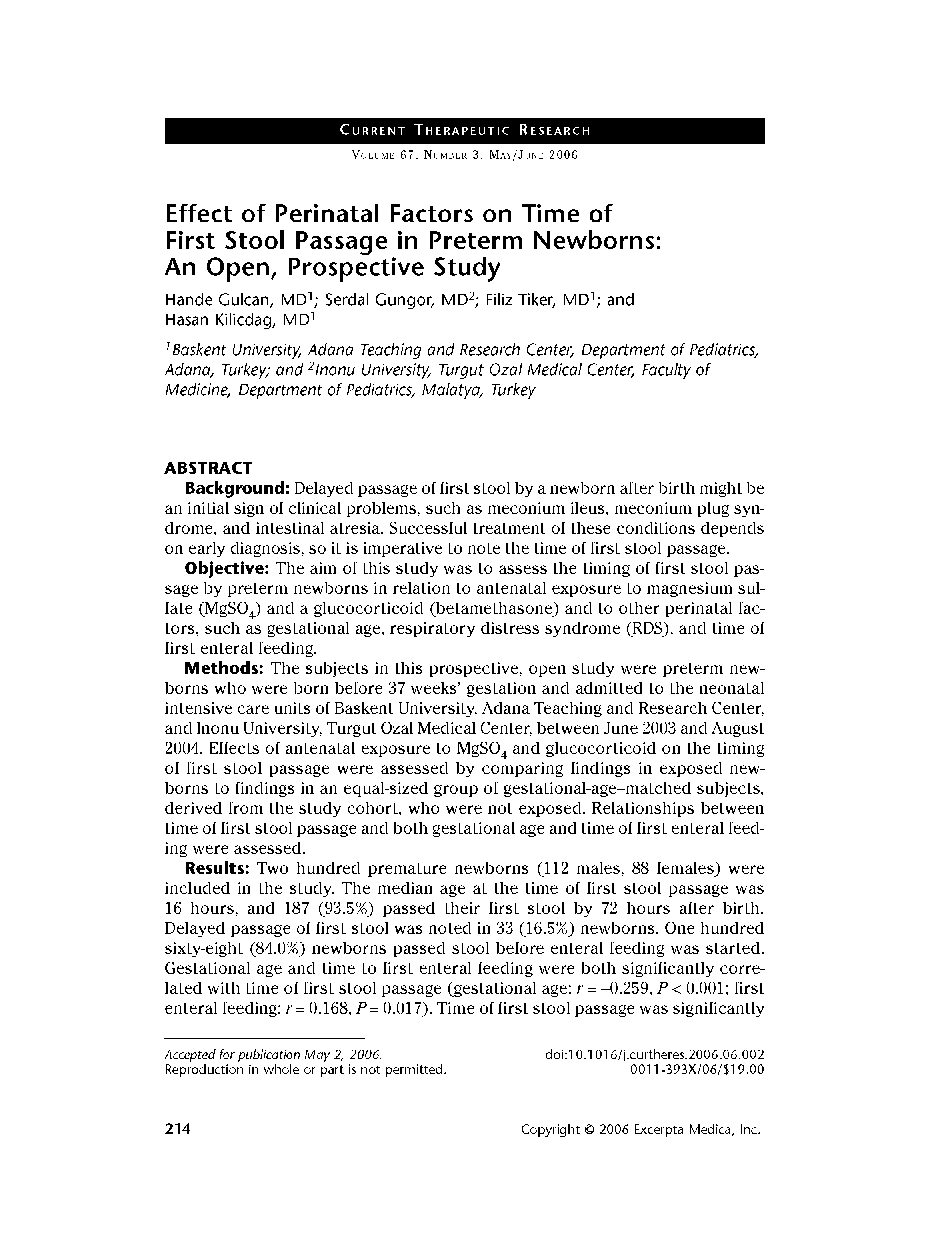| کد مقاله | کد نشریه | سال انتشار | مقاله انگلیسی | نسخه تمام متن |
|---|---|---|---|---|
| 4197089 | 1278748 | 2006 | 12 صفحه PDF | دانلود رایگان |

Background:Delayed passage of first stool by a newborn after birth might be an initial sign of clinical problems, such as meconium ileus, meconium plug syndrome, and intestinal atresia. Successful treatment of these conditions depends on early diagnosis, so it is imperative to note the time of first stool passage.Objective:The aim of this study was to assess the timing of first stool passage by preterm newborns in relation to antenatal exposure to magnesium sulfate (MgSO4) and a glucocorticoid (betamethasone) and to other perinatal factors, such as gestational age, respiratory distress syndrome (RDS), and time of first enteral feeding.Methods:The subjects in this prospective, open study were preterm newbornswho were born before 37 weeks' gestation and admitted to the neonatal intensive care units of Baskent University, Adana Teaching and Research Center, and Inonu University, Turgut Ozal Medical Center, between June 2003 and August 2004. Effects of antenatal exposure to MgSO4 and glucocorticoid on the timing of first stool passage were assessed by comparing findings in exposed newborns to findings in an equal-sized group of gestational-age-matched subjects, derived from the study cohort, who were not exposed. Relationships between time of first stool passage and both gestational age and time of first enteral feeding were assessed.Results:Two hundred premature newborns (112 males, 88 females) were included in the study. The median age at the time of first stool passage was 16 hours, and 187 (93.5%) passed their first stool by 72 hours after birth. Delayed passage of first stool was noted in 33 (16.5%) newborns. One hundred sixty-eight (84.0%) newborns passed stool before enteral feeding was started. Gestational age and time to first enteral feeding were both significantly correlated with time of first stool passage (gestational age: r = −0.259, P < 0.001; first enteral feeding: r = 0.168, P = 0.017). Time of first stool passage was significantly later in 46 newborns with RDS than in 46 gestation al-age-matched newborns without RDS (mean [SD], 44.7 [39.7] vs 20.5 [18.4] hours, respectively; P < 0.05). The newborns whose mothers had received MgSO4 for tocolysis passed their first stool significantly later than gestational-age-matched controls (mean [SD], 26.5 [26.9] vs 11.3 [12.1] hours, respectively; P < 0.05). Antenatal exposure to betamethasone was not significantly correlated with timing of first stool passage.Conclusions:The results suggest that delayed passage of first stool in thesepreterm newborns was associated with gestational immaturity, delayed first enteral feeding, and RDS. Antenatal maternal exposure to MgSO4 was associated with later first stool passage in these preterm newborns, whereas antenatal exposure to betamethasone was not.
Journal: Current Therapeutic Research - Volume 67, Issue 3, May–June 2006, Pages 214-225